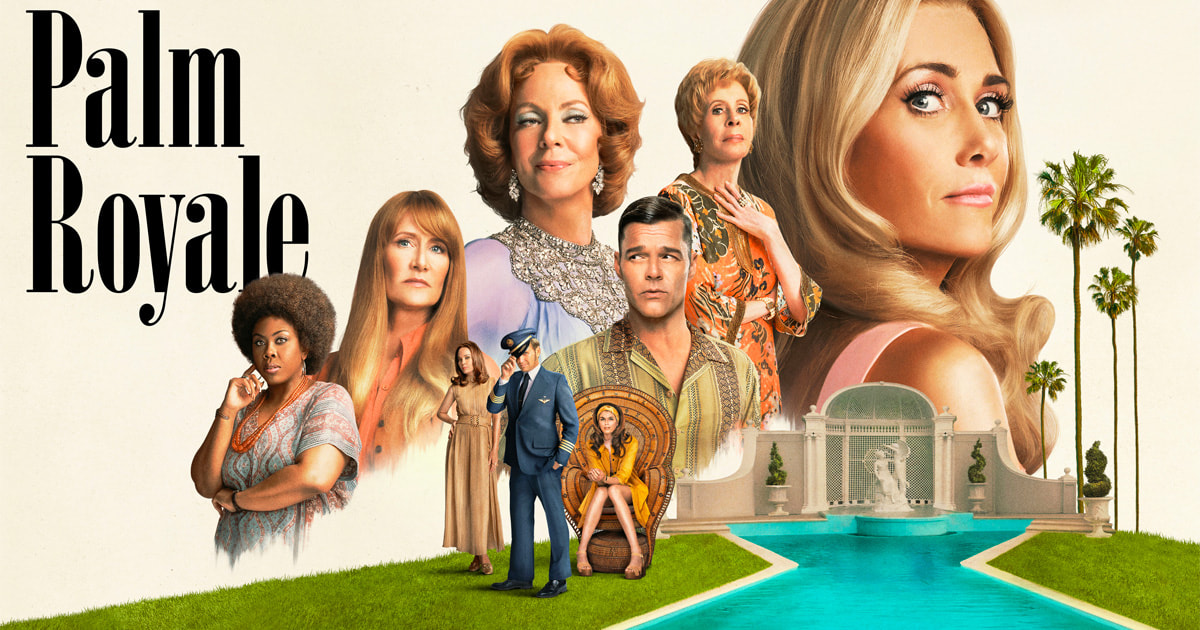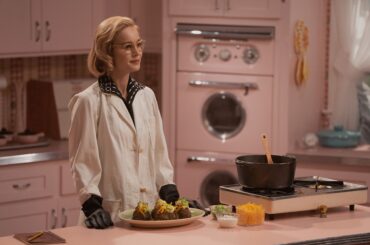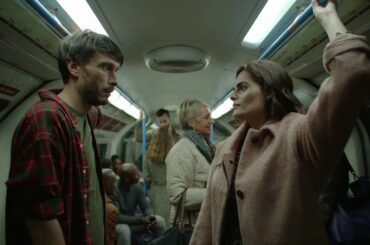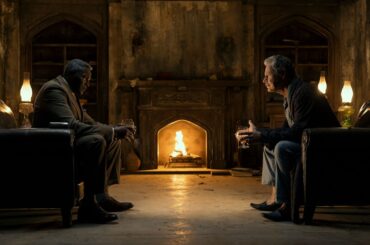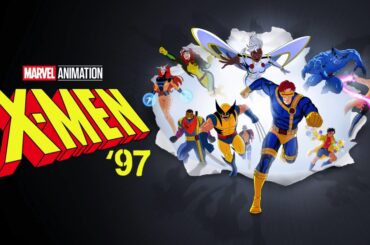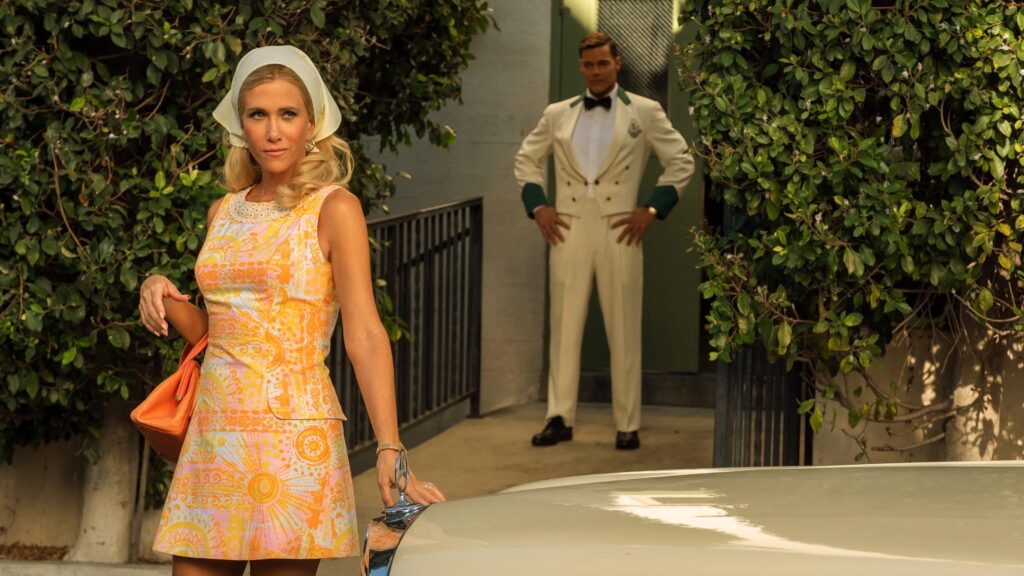
Palm Royale is about glamour. Well, at least the pursuit of it in creator Abe Sylvia‘s colorful melodrama. The show’s anti-hero, Maxine Dellacorte-Simmons (Kristen Wiig), is a wheeling and dealing, happy-go-lucky fraudster with big dreams of a life lived well at the Palm Royale club.
Composer Jeff Toyne makes the huckster’s pursuit of luxury sound like a grand ‘ol time. It’s an unabashedly fun score from Toyne. The composer would enjoy a nice grasshopper, like the protagonist, and sometimes even compose with pill bottles as shakers to get the sound of the party just right. It’s a delightful score that Toyne recently spoke with Immersive Media about composing.
This score actually plays great on its own. It’s just a very enjoyable listen. When you compose, do you ever wonder how a score will play on its own?
No, not really. The music that we do for the film or for the television show has to work for the show first and foremost, and I’m doing my best to bring a musical writing ability to the show. I’m writing music that I think satisfies me artistically in a way, but we just don’t have the luxury of really sitting back and worrying about that.
All we can do is just get the music in on time and to make sure that we’re keeping up with the schedule. Television schedules are really challenging. But, yes, we’re really happy with the way it came out, so it was a nice chore to put together a soundtrack album and assemble it. When it comes to making the album, we will take some time to group things together, so that the listening experience is enjoyable; it’s also a chance to maybe revisit something here or there.
The soundtrack album can sometimes be a different mix than the music, the way it’s in the episodes. Often there’ll be choices made to lower individual elements at the dub stage to account for dialogue especially, or occasionally sound effects and things like that. So, when the music’s prepared for the soundtrack album, we can make a separate mix, make sure that the melodies play really first and foremost, and that the music’s nice and bright. So I do do that, but when we’re writing it for the show, I’m just trying to make great music that serves the show.
Right, and make your time, your schedule.
Given the choice between fast and good, choose fast.
I was just talking to composer Carlos Rafael Rivera (Lessons in Chemistry) about this, just how helpful deadlines are in making you less precious, more full-speed ahead.
I sometimes like to say that I got into film for the deadlines. One of the things that the film and television can give you is this demand that you finish music often and early. If you’re writing concert music, sometimes things can languish unfinished, and if there isn’t a specific deadline, then it can be challenging to finish projects. But I always know when I’m starting a film or television project that, no, we’re definitely going to finish this.
And so, you can be freed from the tyranny of self-doubt when you just don’t really have time to spend on it. You just have to go with your gut a lot of times and hope for the best. It’s a real privilege to work with collaborators that are going to send you back for a revision or a rethink if it needs it. But if it doesn’t, you have that nice collaboration to work with, so that going with your gut, it’s not as scary as just you’re not on your own when you’re doing this.
What were your initial gut instincts for Palm Royale?
Well, I had a brief that I was happy to take on board and dive into, and the rhythm was going to have a Latin flavor. A lot of the times melody was going to, frankly, it was going to exist. That’s not a given in a film score or a television score. We had made the decision that the score was going to reflect a lot of the other elements of production that were period specific. In a way, a lot of the filmmaking was as if the show was made in 1969, not just set in 1969.
I was really delighted to take on board the idea of let’s have a thematic score and a melodic score that embraces jazz and a big orchestral sound. Abe Sylvia used the word “maximalism,” so we were all really encouraged to go big.
What choices and techniques did you want to use to reflect the time period?
Well, first off, we decided we’re going to record live musicians. It presents a whole set of challenges on a television schedule, television budget, but mainly the television schedule. And so, we’re going to have a live orchestra, we’re going to have a live big band, and so that sound is going to be a part of taking us back to that epoch.
I liked to assign instrumental colors as well as melodic phrases and themes to characters, so we could callback to characters or suggest characters through the instruments that are playing and through the melodies that are playing. I liked to do that back and forth. A part of the crafting of the themes for the characters was kind of choosing what kind of an instrument fit with the character and fit with the way that the theme was performed.
For the main characters, which instruments did you want to define them?
So the easy one is Ricky Martin because he starts off on screen playing a trumpet, so I wasn’t going to push against that. We’ll keep that as his instrument. Now, to be specific on screen, you first see him playing a flugel with a Harmon mute in it. But yeah, we took that as his instrument and that made sense too, to call back to his military background for his character.
For Carol Burnett, she had two instruments. I started off with the idea of the accordion for her. To me, it’s older-fashioned, like a Lawrence Welk sound. But later, as her character gains more mobility and just evil intention, her instrument became more and more contrabass clarinet.
Sounds an interesting choice for evil.
Well, you could say it’s cliche, but think it’s cool. That’s the bread and butter of film scores. We work in cliches. I mean, we use it to our advantage. I would say for Maxine, we had a couple of themes for her. I think her character was too big for a single theme and for an instrument. I liked her really bright sparkly percussion instruments, like vibraphone, celesta, and piano.
But for the melody instrument, I took the high clarinet, like the E flat clarinet, the real small one. The musical brief for the show at one point became Henry Mancini meets Bernard Hermann, but Latin. And so, it was really great fun for me to do deep dives into these composers and deep dives into the music of the era, to just to really swim around in that sound and then just hope that it somehow filters through my being and comes out.
Let’s talk more about your relationship as a composer with cliches. How do cliches help you?
Well, I don’t think that film and television music is the place to push back against cliche. I should say maybe it is not a place to redefine musical cliches. I think you can create new ones, but a lot of them that already exist, and we just use them to our advantage. There are just certain instruments that they bring with them a lot of connotations from place or from the style of music.
There are certain turns of phrase that there’s a stock and trade in the same way that there are tropes and lots of cultural shorthands for getting information across really quickly. So yeah, I’m not too worried about if I wanted to suggest something, if I said, “Oh, we’re going to have banjo on this immediately, so you’re going to have some ideas about what kind of show this it.” It brings a lot of connotations with it now. I mean, you can play against them, but you can’t deny them. You can’t be surprised when people have those connections.
For example, your work in Palm Royale, are there any cliches where you think, I actually really like that cliche so I don’t want to break any rules here?
I wasn’t creating music that people hadn’t heard before. This wasn’t often you’ll be able to do something like that for maybe a science fiction show. For the music that we were doing for Palm Royale, the score was going to work hand in glove with the songs that were licensed for the show, and we were going to make music that fit in with a period piece. If I didn’t do it right, you’d know because everyone knows what this music is supposed to sound like. If it doesn’t sound like big band jazz or easy listening or it’s the orchestral over, if I’m not doing it right, people will be able to tell.
Am I wrong or composer Aiko Fukushima, your wife, contributed to the score as well?
You can hear her in the main title and in a couple other places. Not too often, but yeah, there’s a little bit of a vocal element here and there in the score that was inspired by a vocal group in the sixties called The Swingle Singers. She helped out with my other vocalist, who I love, Melissa Kaplan.
I’ve talked to composers that come from a family of composers. I imagine it must be nice for the both of you to have a partner to talk shop with, to know exactly what each other are talking about even on just a technical level.
There are definitely advantages. We both have somebody that we can bounce ideas off of, and if we are running behind on something, we have somebody that might be able to late at night jump in and help do some orchestrations or help do some music copying or something like that.
But we don’t compose together. She does her projects and I do my projects and we’re able to swap roles of support so I can support her on her projects and sometimes produce music for her and vice-versa. She’ll jump in and she’ll help me by doing some singing or some orchestrating or some arranging. But yeah, the idea that we’re just holding hands together at the piano playing together, that’s not how we do it. Maybe other composer couples might do that, but that’s not us.
My wife is very, very honest, and so, the best compliment I can get from her if I play her a piece of my music is for her to say, “Who wrote that?”
[Laughs] This is not a shy score. It covers the period, but it also really gives you the sense of, this is how Maxine hears the world. Right from the beginning, how’d you want the music to communicate her point-of-view?
There are two scenes in the first episode that speak to your question. The first scene is her sneaking into the Palm Royale and not even necessarily knowing that she’s being escorted out, but still very excited to be there. I think I named one of the tracks after her, titled “Relentless Positivity.” She had a relentless positivity that’s fascinating.
In one of the last scenes in the episode, she is basically blackmailing Leslie Bibbs’ character, like, “Don’t make me blackmail you. I want to be your friend.” There’s a slight edge to it, but on the surface, it’s very bright. Musically, I was really trying, and I think we had found a way to do this, to have a very bright veneer with a slight dark edge that we can bring out when we want to.
Palm Royale is now available to stream on Apple TV+.


